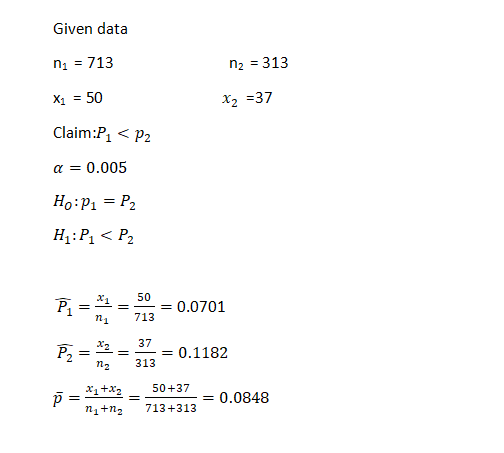You wish to test the following claim that π1<π2 . You use a significance level of 0.005. Ho:π1=π2 Ha:π1<π2 You obtain 50 successes in a sample of size n1=713 from the first population. You obtain 37 successes in a sample of size n2=313 from the second population. Use the Theory-based inference applet to conduct this test of significance. (a) What is the z-score for this sample? z-score = (Report answer accurate to two decimal places.) (b) What is the p-value for this sample? p-value = (Report answer accurate to four decimal places.) (c) The p-value is... less than (or equal to) α greater than α (d) This p-value leads to the following conclusion: we have statistically significant evidence to support the alternative hypothesis the null hypothesis is true the null hypothesis is plausible the alternative hypothesis is true (e) As such, the final conclusion is that... We conclude that the first population proportion is equal to the second population proportion. We conclude that the first population proportion is less than the second population proportion. We have statistically significant evidence that the first population proportion is less than the second population proportion. It is plausible that the first population proportion is equal to the second population proportion.
You wish to test the following claim that π1<π2 . You use a significance level of 0.005. Ho:π1=π2 Ha:π1<π2 You obtain 50 successes in a sample of size n1=713 from the first population. You obtain 37 successes in a sample of size n2=313 from the second population. Use the Theory-based inference applet to conduct this test of significance. (a) What is the z-score for this sample? z-score = (Report answer accurate to two decimal places.) (b) What is the p-value for this sample? p-value = (Report answer accurate to four decimal places.) (c) The p-value is... less than (or equal to) α greater than α (d) This p-value leads to the following conclusion: we have statistically significant evidence to support the alternative hypothesis the null hypothesis is true the null hypothesis is plausible the alternative hypothesis is true (e) As such, the final conclusion is that... We conclude that the first population proportion is equal to the second population proportion. We conclude that the first population proportion is less than the second population proportion. We have statistically significant evidence that the first population proportion is less than the second population proportion. It is plausible that the first population proportion is equal to the second population proportion.
MATLAB: An Introduction with Applications
6th Edition
ISBN:9781119256830
Author:Amos Gilat
Publisher:Amos Gilat
Chapter1: Starting With Matlab
Section: Chapter Questions
Problem 1P
Related questions
Question
You wish to test the following claim that π1<π2 . You use a significance level of 0.005.
Ho:π1=π2
Ha:π1<π2
You obtain 50 successes in a sample of size n1=713 from the first population. You obtain 37 successes in a sample of size n2=313
from the second population. Use the Theory-based inference applet to conduct this test of significance.
(a) What is the z-score for this sample?
z-score = (Report answer accurate to two decimal places.)
(b) What is the p-value for this sample?
p-value = (Report answer accurate to four decimal places.)
(c) The p-value is...
- less than (or equal to) α
- greater than α
(d) This p-value leads to the following conclusion:
- we have statistically significant evidence to support the alternative hypothesis
- the null hypothesis is true
- the null hypothesis is plausible
- the alternative hypothesis is true
(e) As such, the final conclusion is that...
- We conclude that the first population proportion is equal to the second population proportion.
- We conclude that the first population proportion is less than the second population proportion.
- We have statistically significant evidence that the first population proportion is less than the second population proportion.
- It is plausible that the first population proportion is equal to the second population proportion.
Expert Solution
Step 1

Step by step
Solved in 2 steps with 2 images

Recommended textbooks for you

MATLAB: An Introduction with Applications
Statistics
ISBN:
9781119256830
Author:
Amos Gilat
Publisher:
John Wiley & Sons Inc

Probability and Statistics for Engineering and th…
Statistics
ISBN:
9781305251809
Author:
Jay L. Devore
Publisher:
Cengage Learning

Statistics for The Behavioral Sciences (MindTap C…
Statistics
ISBN:
9781305504912
Author:
Frederick J Gravetter, Larry B. Wallnau
Publisher:
Cengage Learning

MATLAB: An Introduction with Applications
Statistics
ISBN:
9781119256830
Author:
Amos Gilat
Publisher:
John Wiley & Sons Inc

Probability and Statistics for Engineering and th…
Statistics
ISBN:
9781305251809
Author:
Jay L. Devore
Publisher:
Cengage Learning

Statistics for The Behavioral Sciences (MindTap C…
Statistics
ISBN:
9781305504912
Author:
Frederick J Gravetter, Larry B. Wallnau
Publisher:
Cengage Learning

Elementary Statistics: Picturing the World (7th E…
Statistics
ISBN:
9780134683416
Author:
Ron Larson, Betsy Farber
Publisher:
PEARSON

The Basic Practice of Statistics
Statistics
ISBN:
9781319042578
Author:
David S. Moore, William I. Notz, Michael A. Fligner
Publisher:
W. H. Freeman

Introduction to the Practice of Statistics
Statistics
ISBN:
9781319013387
Author:
David S. Moore, George P. McCabe, Bruce A. Craig
Publisher:
W. H. Freeman